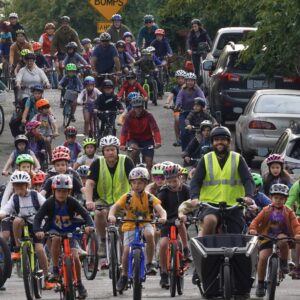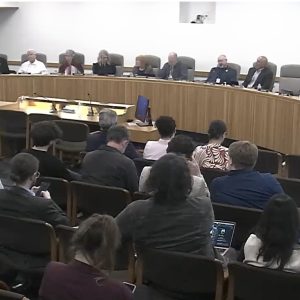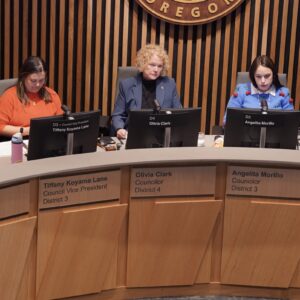
Chair of the House
Judiciary Committee.
Photo: State of OR
The House Judiciary Committee voted 5-4 (along party lines) in favor the Vulnerable Roadway Users bill (H.B. 3314) this morning. The bill was passed with some significant amendments.
The amendments change the base infraction from a Class A misdemeanor to a traffic violation payable by a $237 fine. In addition to this fine, if a vehicle operator is careless and hits a vulnerable roadway user they would then choose between a $12,500 fine and one-year license suspension, or pay $250 and complete a driver improvement course.
For people that cannot pay the $250, a fund would be created (with $25 of the traffic violation fine) and they could seek a grant.
The driver improvement course would likely be operated by a private party, and modeled after DUII education courses.
Now, onto the votes…
Two of the “no” votes were from committee members (Reps. Flores and Whisnant) who said they would support the bill if some of the issues brought up in committee were worked out.
These issues included further clarification about how the driver improvement course would be funded, how to assign responsibility of vulnerable users (like roller skaters and skateboarders) who are not officially recognized as vehicles under current law, and adding seniors and people on personal mobility devices into the definition of “vulnerable roadway users”.
Both Flores and Whisnant will most likely vote yes when the bill reaches the House Floor.
The two members staunchly against the bill were Representatives Kevin Cameron and Wayne Krieger.
Rep. Cameron (R-Salem) agrees with Lt. Mark Kruger (who testified yesterday) that the bill should apply to all road users. Cameron thinks the bill “carves out a special class of users” and said,
“We’re taking a special class and setting them aside, versus just anybody who is injured due to careless driving.”
Committee Chair Greg MacPherson (D-Lake Oswego), countered that opinion by saying,
“My reaction to that is that is there is a special situation for people who are not encased inside a vehicle. they are particularly susceptible to injury and you see some really grievous injuries caused when just a moment’s carelessness on the part of a driver can be life-altering or ending for a bicyclist or a pedestrian.”

The other opposing vote came from Rep. Wayne Krieger (R-Gold Beach). A former State Police officer, Krieger thinks bicyclists and other vulnerable users must hold more responsibility and that singling out motorists is “not right,” Like yesterday, he told more stories of his experience with bicycles on the roadway,
“On the way to work this morning, coming to an intersection, I stopped, and here comes a bicycle right next to me, right through the intersection…and that is a daily thing…and until we get a handle on that and hold them accountable….they’re creating a hazard out there. They’re on a public highway that’s designed for motor vehicles, not for those other uses…and to put everybody who’s driving a vehicle into a situation like this…I think it’s not right.”
I called BTA lobbyist Scott Bricker today and he was busy working the halls of the capitol to gain more votes for this bill. He said this morning’s vote is “progress” but that there’s also a lot of work to do,
“Now we need to get active, we need the community to contact their legislator and let them know they care about this issue. It’s going to be close.”
Bricker expects the vote within the next two weeks.
More info:







Thanks for reading.
BikePortland has served this community with independent community journalism since 2005. We rely on subscriptions from readers like you to survive. Your financial support is vital in keeping this valuable resource alive and well.
Please subscribe today to strengthen and expand our work.
I’m not really familiar with DUI or other infraction logistics, so pardon if I don’t get this straight…
If DUI/Seat Belt/Share The Road classes are taught by 3rd-party private interests, how is this handled?
Are the contracts for this option awarded on a competitive basis? Are results or recidivism tracked? I’m just interested to see if offering these classes is really a service to the community or if it’s just a service to the entities that supply the classes (and it lets the municipality off the hook by letting them offer a “humane” option to stiff fines).
There’s something about somebody making money off the results of a traffic officer’s daily ticket log that just seems fishy to me…
This makes me so upset I can’t craft a response right now, other than to say that as long as careless operation of machinery counts as a mere “traffic violation”, WE HAVEN’T MADE ANY PROGRESS AT ALL IN CORRECTING THE PROBLEM!
I’m sure I’m preaching to the choir on that one.
Greg MacPherson is right on the money, and it’s nice to know that at least one committee member understands the core issue.
BTW, I *do* appreciate the efforts of the BTA, and I understand that this lays groundwork towards more stringent legislation in the future. I’m not saying this bill is useless, I’m just frustrated because the amendments pull most of its teeth and turn a big step forward into a mere foot shuffle.
“Greg MacPherson is right on the money, and it’s nice to know that at least one committee member understands the core issue.”
I work with Greg, and I can tell you from personal experience that he gets it. He’s a great asset to Oregon through his service in the Legislature.
That’s right, Wayne. That highway is designed for cars, not other users. Hence our issue with your carway. Hence our desire to reclaim public space.
Who put whom into a “situation like this?” Are we really “creating a hazard out there?” Or are we simply drawing attention to the hazard that has grown, unchecked, for years in every facet of our transportation infrastructure.
No, “It’s not right.” But we’ve got a long way to go before we get anywhere near “right.”
I like the idea of getting to choose my punishment for killing or maiming someone. I think I’ll choose the cheapo route and pay the $237 fine, the $250 fine and then take the driver improvement course which, I am sure, could be done online at my convenience.
Can you say “useless as the tits on a boar hog”?
http://web.mac.com/labann/Bike_%26_Chain/The_ultimate_guide_to_bicycling_culture.html
Republicans are obliged to say “public highway that’s designed for motor vehicles” because their only constituency is the privileged voter. Police protect their property. Can see where Krieger is coming from.
Wheelmen in the late 1800’s lobbying for paved roads is why they exist at all. Nowadays, about 25% of roads ARE designed for motor vehicles; cyclists and walkers are already banned from them. Surface arteries used to be SHARED space. Thanks to vocal vehicular cyclists, bans are cropping up on them, too. Rudeness reigns. Gore is glorified in the Fast & Furious franchise. Civilization is crumbling. Soon there’ll be no place to bike except separate facilities.
Despite this, ALL THE ONUS of safety rests specifically on MOTORISTS. A kid chasing a ball has the MOST right to the road. The current Pope issued a Papal Bull on this very topic about 2 years ago, saying, to paraphrase, “Motoring should be approached with respect for vulnerable users of street.” The de facto limit where not posted is only 25 mph. Even that is too fast when there are lots of other users, kids playing ball, paraplegics (former motorists) in wheelchairs.
The wanton waste of lives involving motoring must be put under constraints. Traffic carnage is the #3 cause of death in America, while motoring predominantly contributes to cancer and coronary disease, respectively, #2 and #1. For the dangers inherent, they should raise standards for operating a motor vehicle to a level higher than piloting an aircraft. License revocation should be the primary enforcement tool, with mandatory jail sentences for driving without. The reasons it’s not are strictly fiscal. As long as death on the road is profitable, laws will favor motorists.